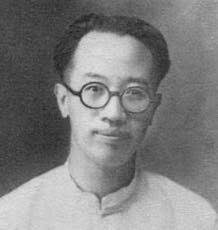Liang Shih-ch'iu (1902-), literary critic, teacher, and translator of Western literature who was a leading figure in the Crescent Moon Society, a group which upheld the individual and aesthetic purposes of literary expression in opposition to the cause of proletarian realism.
Although his ancestral home was in Hangchow, where his grandfather had amassed a modest fortune as a customs official, Liang Shih-ch'iu was born in Peking. His father, Liang Hsien-hsi, was employed by the Peking police force. Liang Shih-ch'iu completed his middle school and college preparatory work at Tsinghua Academy. In the summer of 1923 he went to the United States to enter Colorado College in Colorado Springs. Wxn I-to (q.v.), a friend and schoolmate from Tsinghua, enrolled there at the same time. After being graduated the following summer, Liang moved to Cambridge, Massachusetts, to begin graduate work in English literature at Harvard University. He pursued the same field of study at Columbia University during his third and final year in the United States.
While at Harvard, Liang Shih-ch'iu came under the influence of Irving Babbitt, whose conservative views on the value of continuity and tradition in literature Liang adopted. In a paper written for Babbitt entitled "The Romantic Tendencies in Modern Chinese Literature," Liang scored contemporary Chinese writing for exhibiting all of the defects of nineteenth-century romantic literature at its worst. In its place, Liang proposed a national literature which would borrow its discipline from the literature of traditional China and its form from the classic literature of the W^est. Liang was particularly anxious that Chinese readers should be acquainted with the masterpieces of the European tradition. Accordingly, he devoted much of his time to translating W^estern classics.
Soon after returning to Peking in the summer of 1926, Liang Shih-ch'iu accepted a position at National Southeast University. The following spring he married Li Shu-fang. Because of the social and political turmoil accompanying the advance of the Nationalist armies northward during the summer, he moved to Shanghai, where he remained for the next three years, teaching at Chinan and other universities. Between 1930 and 1934, he taught at Tsingtao University in Shantung.
In the early years of the Nationalist period, Shanghai was a primary locus of cultural and literary activity. The doctrine of literature as an instrument of political action gained widespread acceptance, particularly in leftist circles. To combat the propaganda emphasis that such theories lent to literature, Hu Shih, Hsü Chih-mo (qq.v.), and Liang Shih-ch'iu in 1928 organized the Crescent Moon Society. In its official organ, Hsin-yueh [crescent moon], they sought to expound the ideal of a literature of liberation through which the Chinese people could achieve spiritual freedom. Liang argued strongly for the independent, individual, and aesthetic purposes of literary expression. His opposition to the cause of proletarian literature eventually brought him into sharp conflict with Lu Hsün (Chou Tso-jen, q.v.), among others, and secured for him a position of national prominence in the realm of letters. Liang's involvement in the polemics of these years resulted in a number of volumes devoted to the discussion of literary questions and Liang Shih-i principles: Lang-man-ti ku-tien-ti [the romantic T. I-fu and the classic] published in 1927, an expansion H. Yen-sun of his Babbitt article ; W'en-hsueh ti chi-lü [literary discipline], published in 1928; Wen-i p'i-p'ing lun [principles of literary criticism], published in 1934; and P'ien-chien chi [prejudices]. Yuehhan-sun [Dr. Samuel Johnson], also published in 1934, was a critical biography. Liang was also active as a translator. In 1928 he published A-po-la yü Ai-lu-i-ssu cK'ing-shu [the love letters of Abelard and Heloise] and in 1929, P'an Pi-te [Peter Pan]. He also translated Silas Marner and Wuthering Heights.
In 1934 Liang Shih-ch'iu left Tsingtao University to become head of the English department at National Peking University. His interest in translation continued, but its focus shifted to the plays of Shakespeare. Liang translated 20 of Shakespeare's plays into pai-hua [the vernacular]. Collected as So-shih-pi-ya ming chit [the famous plays by Shakespeare], the translations were published in Taipei between 1953 and 1957. Passages of plain prose and of blank verse are given simply as prose, but rhymed lines are translated into corresponding rhymed Chinese lines, to preserve the contrast.
From 1937 to 1946, Liang resided near Chungking. He lectured, serv^ on the People's Political Council, and work^Lin the Kuo-li pien-i so [national institute o^fckanslation and compilation]. His collection ofi?«niliar essays, Ya-she hsiao-p'in [sketches by a cottager] published in 1949, was written at this time. From 1946 to 1949 Liang was a professor of English literature at National Peking Normal University. He moved to Taiwan in 1949. He was first chairman of the English language department of Taiwan Provincial Normal University and, subsequently, dean of its college of arts. In Taiwan, Liang published several books, including Alei-kuo shih tsen-ma-yang-ti i-ko kuo-chia [what America is like], T'an Hsü Chih-mo [a chat on Hsü Chih-mo], Ch'ing-hua pa-nien [eight years at Tsinghua], and Wen-hsueh yuan-yin [literary affinities]. He also edited the Tsuichin Ying-Han tzu-tien [current English-Chinese dictionary], which was published in Hong Kong in 1958.

梁实秋
字:治华
笔名,秋郎
梁实秋(1902—),文艺批评家、教师、西方文学著作的翻译家,新月社的领袖人物,这是一个反对无产阶级现实主义,主张文学以表现个性和美为目的的团体。
梁实秋的祖籍是杭州,他本人出生在北京。他祖父当税务官积聚了一些家财,他父亲曾在北京警务处工作,梁在中学及清华学堂预备班毕业后,于1923年夏去美国进科罗拉多大学,当时他在清华的同学闻一多也在该校。翌年夏毕业,去马萨诸塞州剑桥,进哈佛大学研究英国文学。他在美国的第三学年与最后一年又去哥伦比亚大学从事同一学科的研究。
梁实秋在哈佛时受白豊德的影响,白壁德关于文学的继承性和传统的价值的保守观点为梁所接受。他写了一篇献给白壁德的文章《近代中国文学中的浪漫主义影响》。他认为当代中国文学表现了十九世纪浪漫主义文学各种最坏的缺点,解救之法在于建立一种民族文学,它应从古代中国文学中吸取原则并从西方古典文学吸取其形式,他渴望国内读者能读到西方古典名著,因此,他以大部分时间用来翻译西方名著。
1926年夏,他回到北京,不久就聘于国立东南大学,翌年春,他与李淑芳结婚。随着国民革命军向北方进军,社会不安政局动荡,梁迁居上海,三年中,他在暨南大学及其他大学教书。1930年到1934年间,他在山东青岛大学教书。
在国民党统治初期,上海成了文化和文学活动的主要中心,文学是政治活动的工具这种观点,被人们广泛接受,特别是在左翼作家之中。为了对抗这种文学理论的宣传。胡适、徐志摩、梁实秋等人于1928年成立了新月社,他们在其机关刊物《新月》上阐明,中国人民将经过文学的解放而获得精神自由,梁实秋强调文学表现应是独立的、具有个性和美。他反对无产阶级文学的观点,使他与鲁迅等人处于尖锐对立的地位,同时也使他成为文艺界的一个全国知名之士。
梁实秋参加这些年发生的争论,结果是产生了一些有关文学问题、文艺原则的书,1927年出版的《浪漫的与古典的》,发挥了他的关于白璧徳的论文中的观点;1928年出版的《文学的纪律》;1934年出版的《文学批评论》,以及《偏见集》,同年又出版了《约翰逊评传》。梁实秋致力于翻译,1928年出版了《阿伯拉与哀绿绮思的情书》,1929年出版了《潘彼得》,还翻译了《织工马南传》、《咆哮山庄》。
1934年梁实秋离开青岛大学,当了北京大学英语系主任。他仍继续从事翻译,但重心已转到莎士比亚的剧本。他用白话译了莎士比亚的二十种剧作。《莎士比亚名著》于1953—1957年在台北出版,原著中的散文和无韵诗都简单地译成散文,有韵诗则译成相应的中文有韵诗,以保存原文的风味。
1937—1946年,他住在重庆附近,曾在政治协商会议作讲演,又在”国立编翻馆”工作,1949年出版了那几年写的文集《雅室小品》,1946—1949年,梁任国立北京师范大学英国文学教授,1949年去台湾,任台清省立师范大学英语系主任,后任大学院院长。他在台湾出版了几本书,其中有《美国是怎么样的一个国家》、《谈徐志摩》、《清华八年》、《文学姻缘》,又主编《最新英汉辞典》于1959年在香港岀版。